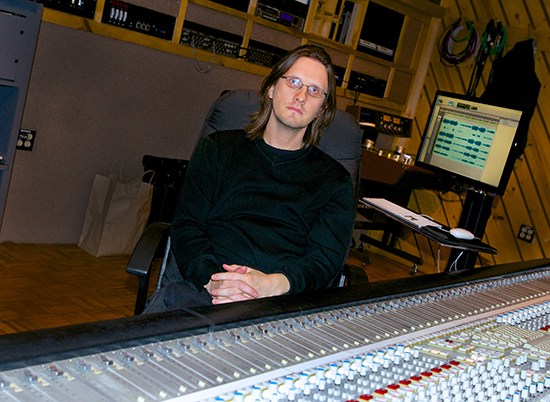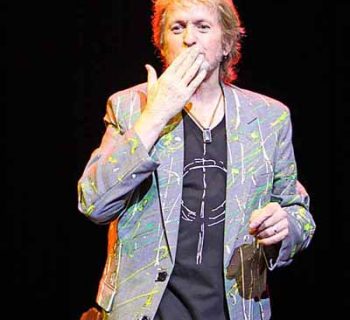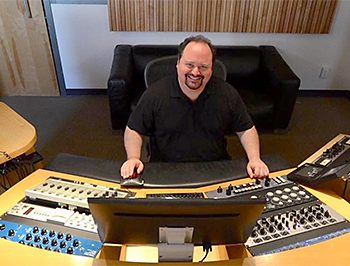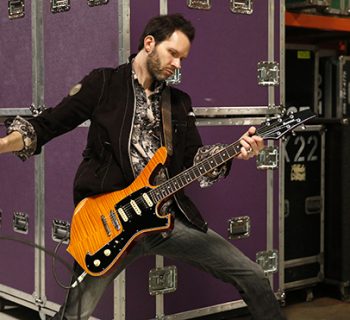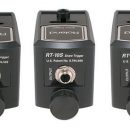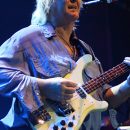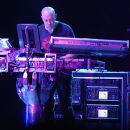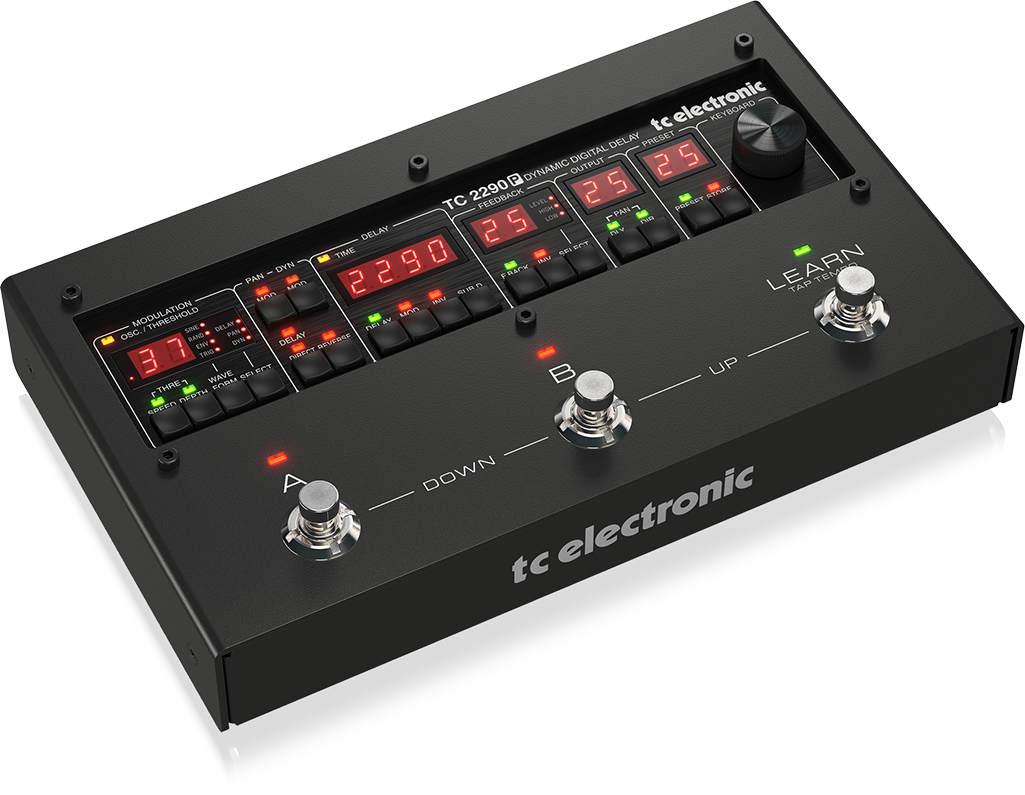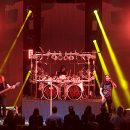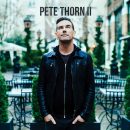To some musicians, Steven Wilson is instantly recognizable as the genius singer, songwriter, and guitarist of Porcupine Tree. Others know him from his musical collaborations including the bands Blackfield and No-Man, some recognize him for his talent producing the metal band, Opeth, and others know him for his award-winning work remixing some of the progressive rock world's most famous albums in 5.1 surround sound.
This winter sees the release of Wilson's third solo record under his own name, The Raven That Refused To Sing and other stories. We were treated to an album release listening event at Avatar Studios in New York City, where we enjoyed reviewing the new music in all of its 5.1 surround glory. Afterward, we sat down with Wilson to talk about his latest solo album, the next Blackfield record, Porcupine Tree, and more.
I'm making the surround mix at the highest possible level that I can because I think that's the way you should always approach art.
MPc: This album is one great reason for people to invest in a good home theater. The surround mix is amazing.
SW: Yeah, I mean, hopefully it still sounds good in stereo, too, but I think—well, you know, you could say that about all… you could say that about not just all my records, you could say that about all layered, textured, well-produced records, period. It's something about this kind of music, I don't know what you call it. Most people call it progressive, art rock, whatever it is. It's so good in surround. It's like three dimensions instead of two and I wish more people would embrace it, I really do.
MPc: I think, for me, the biggest challenge with surround is that… it's hard enough to know that someone has two good speakers, but having five speakers or more calibrated with proper levels...
SW: Yeah. That is a tough thing, but you could say the same thing about stereo, as well. I mean, I've got a girlfriend who lives in Tel Aviv and I go around there sometimes and I see she's got a stereo and she's got the two speakers on top of each other in the corner. I say, "Why the hell…?" She said, "It looks better. It clutters up the room." I said, "But you're listening to it in mono, basically."
But you know what? I think when it comes to making records, you should never, ever underestimate the audience in the sense that—I think you have to make the record based on the fact that people are … the people that really love surround sound are going to have invested in a good system and they're going to invest their time in listening to it properly.
I can't really compensate for all those people that have just got some dodgy 5.1 cinema in a box that they bought from Walmart. And there are a lot of those people. But they'll probably still get something out of it, too, but I'm making the surround mix at the highest possible level that I can because I think that's the way you should always approach art, anyway.
MPc: Now, let's back up interview-wise and tell me about the new record.
SW: Okay, it's my third solo record. It's not my third solo record [really], it's actually one of many solo records, but it's the third record I've made under my own name. The first three Porcupine Tree albums are solo records. There are others—Bass Communion records are solo. But this is my third record I've made under my own name. The difference this time is it's the first record I've made with a band, a kind of cohesive, well road-tested band that are all communicating in a really good way, and the material was written specifically for these guys to play. And that's different to the first two solo records, where I wrote them very much without particular musicians in mind and then found people to play on them later.
So I think this record, firstly, has a more cohesive feeling of a band playing—it was all recorded live in the studio, as well, in seven days in L.A. last September. Has a more cohesive, live feel. And, secondly, because of the musicians, because I've toured with these musicians, I know what they're capable of and I think I've written—I've projected my creativity to a higher level, knowing what they're capable of. Stuff that I'm not capable of playing.
Usually I write within my own means, stuff I could play. This time I've written stuff that I couldn't play, but I can hear it in my head and I can get it out into the world so that they can learn it and play it.
That's the first thing. The second thing is lyrically and subject matter-wise, this album is based on a set of supernatural stories, ghost stories, and actually some of the songs started out as short stories. And some of those short stories will be in the special edition, the book's edition.
And I like records that have a kind of cohesive, conceptual sense of completeness. I've always loved records that hang together with.
So that became the kind of hook on which I hung all the songs this time.
MPc: It's interesting, the notion of ghost storieshttp://stage.musicplayers.com/blog/wp-admin/plugins.php because, while I was listening to the album, I couldn't get out of my head the Broadway musical, "Phantom of the Opera."
SW: Really? I've never seen it.
MPc: Just in terms of very… a lot of the orchestration was so cinematic and very much like a feeling I would have gotten from the theater.
SW: I think what you might be tapping into is the kind of tradition of gothic horror stories, gothic supernatural. And I've never seen "Phantom of the Opera," but I happen to know that it is based on a very early 20th century book.
But I think that's interesting, because the inspiration for the stories and the songs was not modern horror or modern supernatural. It was definitely the tradition of the Victorian, late 19th century, early 20th century, the classical ghost story… And those stories are not horrific in the way that we think of as Hollywood horror or modern horror. They are more—they have what's I would say is more of a sense of dread. And the sense of dread comes from atmosphere and feeling and also from the fact that the stories are firstly stories about people and relationships and secondly about the supernatural. And that's something that most modern horror gets the other way around.
The classical ghost stories are more stories about tragedy, about regret, about people unhappy in certain situations, whether it's relationships or not. And then the horror and the supernatural element comes from that.
So that was definitely what I was interested in tapping into, not the kind of modern idea of ghost story.
MPc:How do you feel about Emily Brontë's, Wuthering Heights?
SW: Yeah, those kind of stories. That's a great example. That's an example of a story that's primarily a love story. But it has a supernatural element to it and that is exactly what I think makes it so powerful and [why it's] so timeless, because the heart of that story is a romance and something that will transcend time.
MPc: Tell me about working with Alan Parsons recording your record.
SW: Well, Alan… I wanted an engineer, I wanted the record to have a kind of quality that I recognized from all of the records I loved from the '70s. And I wanted someone to engineer the record that was making records at that time and knew what they were doing. And a lot of those guys are retired or they've gone deaf, whatever it is. And Alan was one of the guys that was still around, still producing, still engineering and the one reservation I had about Alan was is this guy going to be able to just—"just"—be an engineer? Because he's so used to performing and producing himself.
And he was great! I mean, he deferred to me on the production. But he basically allowed me to just get on with directing the band and the music and he got—as you hear—he got great tones and sounds, exactly the kind of things I wanted.
I wanted a more… I wanted a very organic, golden musical tone and texture. Something I recognized from records I grew up listening to, that I miss in most modern records. Most modern records sound nasty to me. Lots of treble, lots of bass, lots of compression. Like someone screaming in your face for fifty minutes. I don't want that. I want dynamics, I want texture, I want beauty, I want that kind of golden quality in the sound.
And, listen, this is a guy that recorded arguably the greatest, sonically the greatest record ever made. Not musically, perhaps, whether you like it or not, but sonically you'd have to say Dark Side of the Moon, whatever you think about it—it's not my favorite record, but sonically I listen to it and I say this record sounds—there's nothing better. The sound of it is extraordinary. And this is the guy that recorded that record. So, it was like a no-brainer, really, when we knew he was into doing it. I said, "Great, let's get going."
MPc: Did you record to tape or did you record into the computer?
SW: We recorded to [Apple] Logic, which is the [DAW] I use. We recorded very high resolution—96K, 24-bit. And I suppose the point is that everything that was going in before it got to Logic was analog. So the instruments were analog, they were going through real amplifiers, going through tube microphones, and valve microphones into tube and analog compressors and EQs, through an analog mixing desk, finally recorded digitally at very high resolution. And I personally think that's the best combination, because I love working with computers. When I got all the stuff back to my home studio, I was able to do editing and shit that I would never be able to do—you know, we record all these songs about five or six times, five or six takes. So I was able to compile my favorite parts from each take. And I could never have done that with tape.
MPc: Now, are you still mixing in your old bedroom?
SW: No, actually I moved to a house about three years ago. But nothing particularly any more impressive than that. I mix in a room in my house. I don't have a mixing desk, everything is mixed inside the computer. That is what I do best, that's what I grew up doing, learning how to record and mix in computer. But we record everything at very high level. All the data capture is done at a very high level, the capture of the music. And then I mix completely in a computer.
So, people say "Can I come and see your studio?" And I say, "Well, you can, but you're going to be disappointed, 'cause it's…" You know, it's not that like that out there [referring to the 72+ channel SSL mixing desk in the control room just outside of the room in which we were talking]. I think most people's idea of a studio is like that. But most studios these days, mixing studios, it's a computer.
Blackfield
I never felt my voice on its own was that strong, but then when I heard what you could do with layering of voices,
it opened up that whole area of possibilities for me.”
MPc: Now I understand we're going to have a new Blackfield record this year, as well.
SW: Yes, we are, yes.
MPc: Can you tell me a little bit about that record?
SW: Well, I'm not really involved in Blackfield as much as I was. I still helped. Aviv's written the whole record. He's had a bunch of guest singers come in, including some quite famous singers—which, I don't know if he's announced yet, so I'll not mention—but I've still helped him. I've mixed the record for him and I've played some guitar and I've sung on one or two songs.
It's great. I love what Aviv does, but I had to make some decisions about what I could do. People say I'm a workaholic and I'm always doing a million things. Well, it's true, but I have had to be a little bit more selective. So Blackfield is going to go on. They're going to go on the road without me. But it's a great record, and I'm on it, and I've mixed it and it definitely continues in the Blackfield tradition.
MPc: It's funny, I actually felt a little bit of a Blackfield vibe in your new song, "Drive Home."
SW: Well, if you look at all the things I've done, you will always find common areas, of course. The common area, I guess, is me, so that my personality always comes through, so there is always a little bit of crossover, yeah.
MPc: Now, in the past, there are a couple of things you've told me that I'm curious to see how you view those things today.
First, I still remember you telling me that you really didn't think much of yourself as a musician.
SW: Right, well, that hasn't changed. [laughs]
MPc: I think, though, that most people would say you're a fantastic musician.
SW: Well, it depends on your definition of "musician." I mean, I'm not very good at playing any instruments… this is why I've got such a great band. But if your definition of musician is broader [in the sense of 12:34 xxxxxxxxx] someone who creates music, then I think I'm pretty good at writing and making records, yeah.
I think when you asked me that question before, probably I was thinking of it in the more literal terms, as someone who could sit down with a guitar or a keyboard and impress you, and I can't. I'm very basic with guitar, very basic with keyboards. But I can do a little bit of everything and I can write music and I can make records and I can produce and mix and make records and I have a vision for doing that. And I think I'm pretty good at it now after doing it for 20 years.
So if your definition of "musician" kind of includes that, then, yeah, I think I'm pretty good at that. But I suppose I was thinking more in the literal definition of someone that could impress you with a guitar. I can't.
MPc: Now, your vocal arranging…
SW: I'm good at that. I know I'm good at that, yeah. [laughs].
MPc: Where did that come from?
SW: Listening to a lot of Brian Wilson record, a lot of Todd Rundgren records, a lot of Crosby, Stills & Nash. Anyone where there's just fantastic, multi-layered, different vocal parts, overlapping vocal parts. I love all that stuff. I totally—about the time of Porcupine Tree made an album called Stupid Dream in I think 1999 or 2000… anyway… Well, that was the first time I really got into vocal arranging. I think I'd done a little bit on Signify. But the whole period of time then, I was totally obsessed with the Beach Boys and Brian Wilson, as many people have been over the years. And that started me, it really started me off in making vocal orientated music. Because until that point, Porcupine Tree had really been an instrumental band with occasional vocal. If you listen to any of the first three albums, there's a couple of songs, but they're primarily instrumental and the vocals are like just another part. And then suddenly I get into this idea of writing songs which are really vocal-led for the first time and it was really listening to people like what Brian Wilson could do with a voice and Todd [Rundgren] and Crosby, Stills, Nash & Young guys. Because I never felt my voice on its own was that strong, but then when I heard what you could do with layering of voices, it opened up that whole area of possibilities for me.
My voice is not strong but, you know what? Neither is Brian Wilson's voice. And listen what he does when he sings… you know? Yeah, so that was that.
“I don't know if Porcupine Tree will make another record.”
MPc: One of the other things that I remember you telling me was probably around the time of the second Blackfield album. You said to me that Porcupine Tree was going to be your outlet for your more progressive stuff and Blackfield was your pop outlet.
JH: Right.
MPc: And now your solo records have been pretty… I won't say "eclectic," but they definitely straddle a line somewhere between the two extremes. How do you see the evolution of Porcupine Tree in relation to the various projects you've been working on lately?
SW: Well, I don't, is the answer. I don't know if Porcupine Tree will make another record. I mean, I'm not saying we won't, but I'm not saying we will. So I don't know at the moment.
The interesting thing about Porcupine Tree I think for me is that it got to a point where we made ten albums in the space of fifteen years. It was an incredible evolution. The band reinvented itself over and over again and I got to the point with The Incident where I just didn't know what to do with the band next. I couldn't imagine what to do with the band next. And I'd never been in that situation before. And I knew that that was a sign to do something else.
It's funny how people expect you, if you're in a successful band, just to keep on churning out products, albums. I've never felt that. I've just felt like, if you've got something to say, you say it. If you haven't, stop and do something else. It's one of the joys of being a musician, [that] you can work with different people.
So, I don't know, is the answer. Maybe nothing; maybe something. One thing I do know is that, if we do ever get back to make another record, it would have to be a reinvention. I don't want to make another record—not that I don't like The Incident, but I felt with The Incident for the first time maybe we started to repeat ourselves, and I felt that was the sign for me.
The problem about being in a band, you see—actually, it's also the advantage, but it's the disadvantage of being in a band. The advantage and the disadvantage of being in a band is the same, which is that you all have to agree on what you're going to play and, by necessity, that becomes a fairly small, narrow definition. If I come in with songs that one of the guys doesn't like and doesn't want to play, then we won't play it. So you end up with a fairly narrowly defined area where, okay, we all agree we want to play this kind of music. Now, that's great, because that's what gives the band such a strong identity.
But it also becomes, for someone like me, it becomes very restrictive. I want to bring more jazz influences into the group. Oh, the keyboard hates jazz, so we can't do that. I want to do a piece with just piano and voice. Well, you're in a band, you can't really do that, it's not fair. What are the other guys going to be doing on that song? So, all these politics comes into…
The thing about the solo project for me—and it's no coincidence it's the first time I've used my own name on a project… It's the first time I really felt that I was somehow encapsulating every aspect of my musical personality, rather than just one. And I think people always thought Porcupine Tree was my musical personality, because it was a successful project. But even at that time, I had all these other parallel projects going on, as you know. Not just Blackfield, but Base Communion, IEM, No-Man, Storm Corrosion more recently. And I think what's nice about the solo project, as you kind of hinted at, is that it kind of hits all of them. And I like that. I like that. It's taken me 40 years to feel confident enough to do that, but yeah, I like that.
MPc: Listening to the new record, the way you went with the orchestration and the layers and the dynamics, like I said, there was a cinematic element that I kept hearing. Have you thought about doing film scoring?
SW: All the time. I would love to do it. [But] no one will give me a job. It's as simple as that. I would love my next project—and we are working on this, actually, we're taking a bit more—when I say "we," I mean my manager and me—we're taking it a bit more seriously now. I went to L.A. earlier last year to talk to him about it.
I would love my next project to be a movie soundtrack with a really interesting film, interesting script, interesting director. But it's a tough industry to get into. And they tend to not take you that seriously unless you go out and live in L.A., which I don't really want to do.
But, yeah, absolutely. I've thought about it probably for the last 20 years. I guess it's partly been my own sense of not being able to commit properly to it, because I've always been doing my own thing. And partly, the fact that it is a very tough area to get into. It would be great if it was as simple as me wanting to do it, but it's not, because I've wanted to do it for a very long time. Somebody has to want me to do it, too. And when I say "somebody" I mean like a director or a studio or a producer. And it's got to be a good movie. I'm not going to do Police Academy 7 or Cheaper by the Dozen 3, I don't want to do those kind of movies. I want do something good, so, you know… Yeah, absolutely, I've thought about it a lot.
MPc: It's funny because, just this past summer, I did a feature story with Trevor Rabin.
SW: Oh, he does a lot of that stuff.
MPc: He left the band, Yes, behind at the beginning of the '90s to just do soundtrack work, and he became Mr. Hollywood. And he just this past year finally put out a new solo record of instrumental music, 20 years later.
SW: I know, yeah.
MPc: He said, basically, once he got into the soundtrack thing, it kept him so busy that it just prevented him from getting to work on music for himself.
SW: I would never want to be in that situation, but yeah, I think in a sense it's something you have to fully embrace and commit to. You have to go live in L.A. You have to pretty much do nothing else. I mean, the thing is, all the guys that do movie soundtracks, with the possible exception of Trent Reznor, that is pretty much what they do. You know, your John Williams, your Hans Zimmers, your Alexandre Desplats—those guys, you just see their name on movie credits. They don't go off into the world for a year and then spend a year doing a movie. Because you can't do that, because the movie studios won't take you seriously, as I found out. And I think ever Trent is now thinking, because he's going back to do Nine Inch Nails now, isn't he? He's done two movies and he realizes that he's going to lose the part of his musical personality if—you could keep doing that forever quite easily, especially when you've won an Oscar, the work's going to come in.
So I think I would love to do it, if it's possible, but I wouldn't want to get stuck doing it for the rest of my career.
MPc: Great. On the making of the new record, any changes gear-wise in terms of guitar and amp of choice? Still PRS, Bad Cat…?
SW: I played a little bit. I did all the acoustic guitars on this record and I used an Ovation guitar with Nashville tuning, enormous guitars. You know about Nashville tuning?
MPc:Yeah. Have you used Nashville tuning before?
SW: No, it was the first time. So, all the acoustic guitars are double-tracked with a Nashville acoustic guitar and then double-tracked with electric, with a normal, warm sound, with normal tuning. And you get a wonderful kind of chiming—particularly the finger-pick stuff, on like "Drive Home" and "The Watchmaker," that's done like that.
The electrics guitars, I played my PRS through an [Vox] AC30, actually. Because we did it out in L.A., we could hire, basically hired a bunch of things, and we hired an AC30 out there for me. And some TC [Electronic] pedals.That's about it, really. I kept things very organic. I don't like to put a lot of technology between the musical personality and the performance. So we did a lot of stuff in a very organic way on this record. We all played live in the studio together. A little bit of overdubbing later, obviously, but ultimately 90% of what you heard was six guys in a studio playing the tracks live.
MPc: And are you going to get back out on the road again with this band lineup?
SW: Yeah, we start on March the 1st in Europe and we're out in America at the end of April. It's a new show. Lots of visual stuff and, it's going to be exciting.
Photos by Naki except opening photo by Scott Kahn

